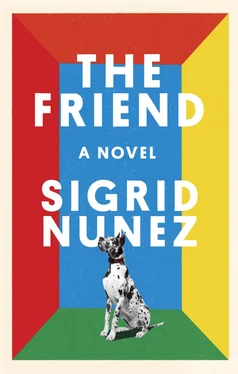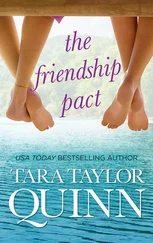Rilke, in whose work Apollo is a recurring figure.
• • •
The book is short, it can be read aloud in about two hours. But soon Apollo has dropped off, like a child at whose bedside a mother has been reading and waiting for precisely this moment to tiptoe away. I’m not tiptoeing anywhere. Pinned beneath his weight, my feet have gone numb. I wiggle them and he wakes. Without getting up he seeks my hand, still holding the little book, and he licks it.
Now we are both up, heading for the kitchen. I pour him some kibble—it’s that time—and while he eats I get ready to take him out.
• • •
I might have dismissed the incident as something out of my anthropomorphic fancy, but the very next day this happens: I’m sitting on the couch with my laptop when Apollo comes up and starts sniffing the books on the coffee table. His giant jaws open and close around the new paperback copy of the Knausgaard book that I bought to replace the one he destroyed. Oh, not again ! But before I can take it away, he gently places the book by my side.
• • •
I’ve heard of therapy dogs, of course. Dogs trained to work in hospitals, nursing homes, disaster areas, and the like, their purpose to bring comfort and cheer in hopes of lightening whatever suffering humans might be going through. I know such dogs have been around a long time, also that they are now often used to help children with emotional or learning difficulties. To improve speech and literacy skills, children in schools and libraries are being encouraged to read aloud to dogs. Excellent results have been reported, with children who read to dogs said to progress significantly better than children who read to other humans. Many of the listeners are said to appear to enjoy themselves, showing signs of alertness and curiosity. But an analysis of the full benefits to canines of being read to by humans is not something my research turns up.
It occurs to me that someone used to read to Apollo. Not that I think he was a trained certified therapy dog. (Would such a valuable animal end up a stray?) But I believe that someone must have read aloud to him—or if not to him at least while he was present—and that his memory of that experience is a happy one. Maybe it was just that whoever did the reading was someone he loved. (Was it you? Not to her knowledge, says Wife Three. Never in her presence, at any rate.) Or maybe, though not a professional therapy dog, Apollo had nevertheless been expected to help someone by listening to that person read, a responsibility he took seriously and for which he was praised and rewarded. It’s in the nature of many dogs to do some kind of work, training manuals say ( assigned a task, dogs showing signs of boredom or depression often perk up ), but people almost never give them enough—if anything—to do.
Or maybe Apollo is a canine genius who has figured something out about me and books. Maybe he understands that, when I’m not feeling so great, losing myself in a book is the best thing I could do. Maybe this is something his phenomenal nose tells him. If, as studies show, a dog’s nose is capable of detecting cancer, it would not be surprising if it could also detect changes caused by the relief of stress, or by the experience of mental stimulation or pleasure. If some dogs can predict seizures in people, as we know has occurred, how strange would it be for one to predict a looming fit of the blues?
In fact, the more I live with Apollo, the more convinced I am that Grumpy Vet was right: we humans don’t know the half of how dogs’ brains work. They may well, in their mute, unfathomable way, know us better than we know them. In any case, the image is irresistible: an avalanche of despair and, like the Saint Bernard coming through the snow with a mini barrel of brandy, Apollo fetches a book.
Even if we know Saint Bernards never really did that.
There was a time when it would have been clearer to me whether reading Rilke’s letters to a young poet to a dog was a sign of mental unbalance.
I decide to make reading aloud part of our routine. Knowing how this might look to others, though, I don’t tell anyone. But then there’s a lot in these pages I’ve never told anyone.
It is curious how the act of writing leads to confession.
Not that it doesn’t also lead to lying your head off.
• • •
Like Rilke, Flannery O’Connor wrote a series of letters to a stranger who wrote to her one day out of the blue. In the collection of O’Connor’s letters published after her death, this particular correspondent, who’d asked to remain anonymous, is called A. At thirty-two she is two years older than O’Connor, who is nevertheless more than up to shouldering the role of mentor. The letters to A., written over a period of nine years, are filled with thoughts about literature and religion and what it means to be a writer and a believer in the Catholic Church. She talks freely about her fiction writing, and when A. sends her some of her own fiction the response is encouraging. A. has a gift for story writing, O’Connor says, judging one particular story to be “just about perfect.” When A. appears to be suffering from a block, O’Connor is quick to blame the devil. For the serious Catholic O’Connor, the devil is not a metaphor.
Though in time the two women arrange to meet, they will not do so often. Meanwhile, on paper, the friendship thrives, bringing them close enough for O’Connor to call A. her “adopted kin.” Overjoyed when A. decides to join the Church, she agrees to be her confirmation sponsor.
But in the end the devil won. A. loses her faith. She leaves the Church. Though she produces work in several genres, she publishes nothing. At seventy-five, thirty-four years after O’Connor’s death from lupus at the age of thirty-nine, Hazel Elizabeth Hester, known as Betty, shoots herself to death.
• • •
If O’Connor had been my mentor, if she’d been writing to me, I might have asked her this: What exactly did Simone Weil mean when she said, When you have to make a decision in life, about what you should do, do what will cost you the most.
• • •
Do what is difficult because it is difficult. Do what will cost you the most. Who were these people?
• • •
If writing wasn’t painful, O’Connor says, it would not be worth doing.
Turn then to Virginia Woolf, who said that putting feelings into words takes the pain away . Making a scene come right, making a character come together: there was no greater pleasure, she said.
—
First faculty meeting of the semester. Should students be allowed to read assigned books on their cell phones. The majority is firm: other electronic devices, okay, but for God’s sake not cell phones. But where’s the logic, argues O.P. If all we’re talking about is screen size. Isn’t that like saying they can’t read printed books in pocket editions? No, that’s different, the majority agrees. Though fifteen minutes later no one has succeeded in articulating exactly how so.
• • •
Office hours. Student A is frustrated that the program requires so many reading courses: I don’t want to read what other people write, I want people to read what I write. Student B is concerned that so much of the assigned reading includes books that failed to make money or are now out of print. Shouldn’t we be studying more successful writers?
• • •
It happens fairly often: I hear from a former student that she’s had a baby. The book she’d been working on has had to be put aside. Maybe when the child is a little older she can get back to it, she says. Then, when the child is a little older—usually around two—she has another baby.
Читать дальше












